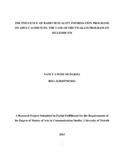| dc.description.abstract | Sexuality issues pose a great challenge to Kenya’s development. Credible information on
sexuality is not always easy to come by and sexual matters, though intended to be educational,
are still largely considered taboo. Conclusions of a study by Communications Commission of
Kenya (CCK) in 2012 and an analysis of the media landscape in Africa in the year 2007 and
2008 concluded that FM radio stations have gone overboard in terms of sexual matters. In line
with the above stated problems it is clear that the existing tools and aids for informing and
educating the public on sexuality issues could certainly do better and achieve more.
The main objective of this research is to explore the challenges that adult audiences face in their
perception of sexuality issues, the appropriate and relevant disclosure of the same, and
programming of content that suits their needs. Based on the problems stated, the purpose of this
study is to fill this gap by investigating the extent to which the Obutwakani program has met its
objectives and also determine its limitations and how it can be improved. The study was
fashioned along a descriptive design, and entailed the sampling of 50 adult listeners of
Obutwakani program in Mulembe FM who were selected using purposive and convenient
sampling. Data was collected from the adult listeners using telephone interviews, while key
informants were interviewed face-to-face using questionnaires. The study was guided by the
theory of uses and gratification which is concerned with how people use media to gratify their
needs. It found that a majority of the respondents who participated in the study largely agree that
the content on Obutwakani program is a true reflection of the challenges that they face on
sexuality and the material that is aired on Obutwakani adds value to their lives.
The study disapproved the common notion that listeners are only those with little education and
knowledge on sexual matters. It suggests that program managers and presenters need advanced
information and training to update themselves with the current trends in sexual information
programs. By considering that the adults are tuned in and are seeking content on sexuality, it can
benefit our government, advertisers and media to provide credible channels for the audiences to
access the right information on sensitive issues such as sexuality. The onus is on the
maximization of the utilization of radio’s power of reach, and engagement not just to entertain
the audiences, but also empower them as they seek for relevant and reliable sexual information. | en_US |

